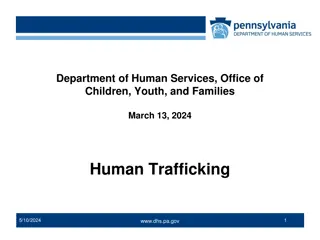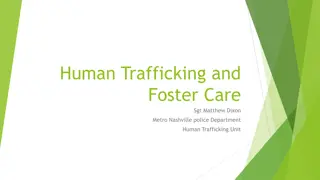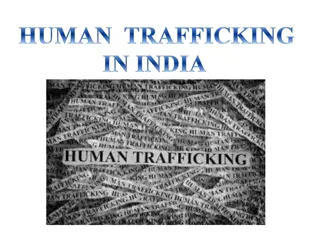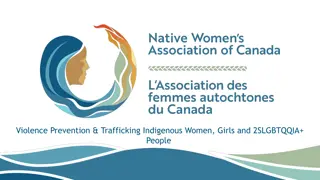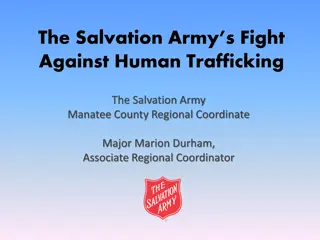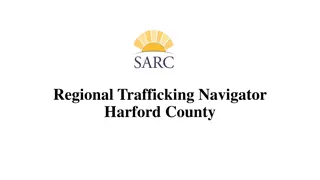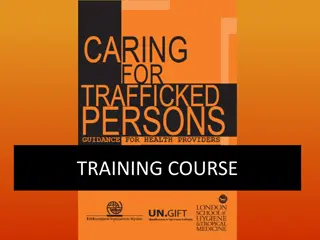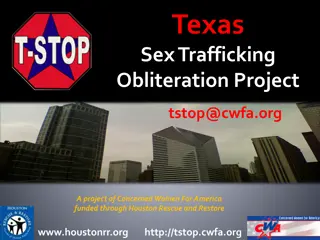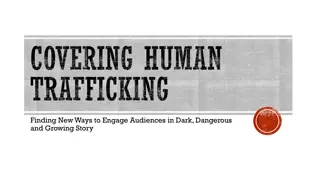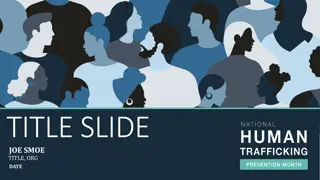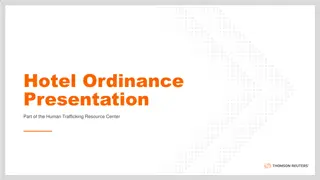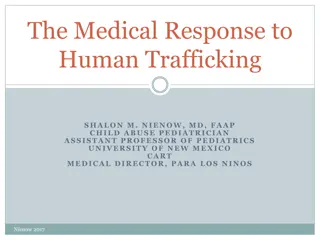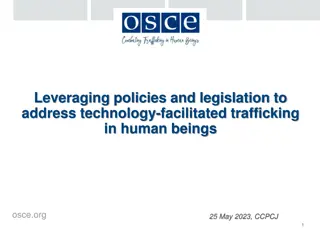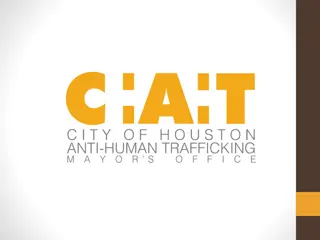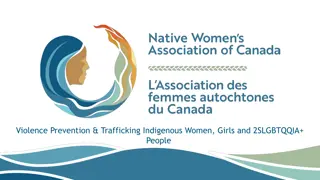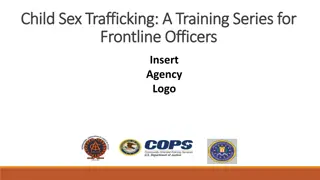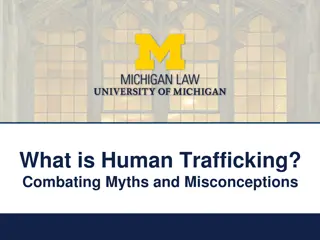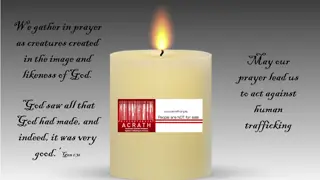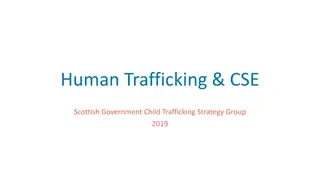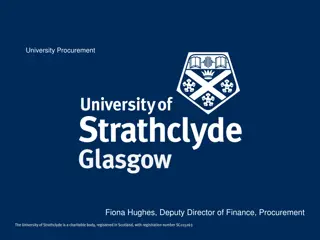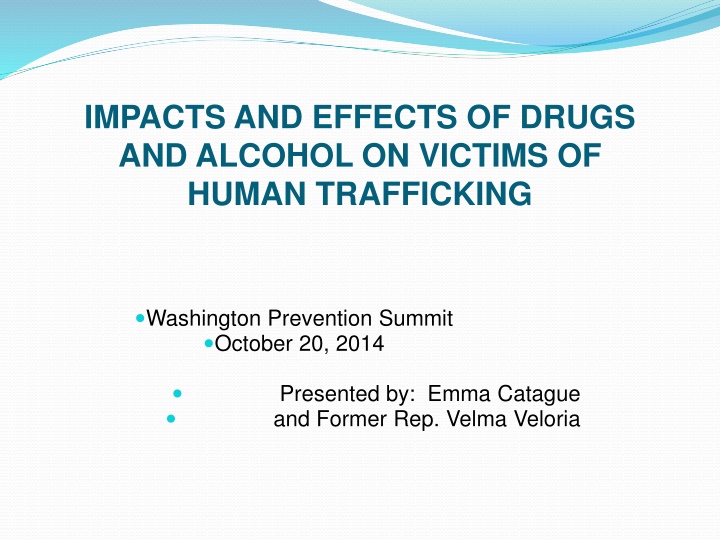
Impacts of Drugs and Alcohol on Human Trafficking Victims in Washington State
Explore the impacts, effects, and root causes of drug and alcohol use on victims of human trafficking, alongside the history and local manifestations in Washington State. Learn about the victims, traffickers, and the alarming involvement of runaways in commercial sexual exploitation.
Download Presentation

Please find below an Image/Link to download the presentation.
The content on the website is provided AS IS for your information and personal use only. It may not be sold, licensed, or shared on other websites without obtaining consent from the author. If you encounter any issues during the download, it is possible that the publisher has removed the file from their server.
You are allowed to download the files provided on this website for personal or commercial use, subject to the condition that they are used lawfully. All files are the property of their respective owners.
The content on the website is provided AS IS for your information and personal use only. It may not be sold, licensed, or shared on other websites without obtaining consent from the author.
E N D
Presentation Transcript
IMPACTS AND EFFECTS OF DRUGS AND ALCOHOL ON VICTIMS OF HUMAN TRAFFICKING Washington Prevention Summit October 20, 2014 Presented by: Emma Catague and Former Rep. Velma Veloria
What is Human Trafficking Human Trafficking: The use of force, fraud or coercion to compel a person into any form of work against his or her will. Federal Definitions Labor Trafficking: Using force, fraud or coercion to recruit, harbor, transport, obtain or employ a person for labor or services in involuntary servitude, debt bondage or slavery Sex Trafficking: Commercial sex act induced by force, fraud or coercion, or in which person performing the act is under age 18
History of Human Trafficking in Washington State 1995 murders inside the KC Courthouse -Phoebe Dison, Victoria Laureta, Suzanna Blackwell (mail order bride) 1999 Murder of Anastasia King (mail order bride) 2001 1st U.W. Women's Center conference on HT -study OCVA study Does HT exist in WA 2003 HB 1175-making human trafficking a crime 2003 Joint Oversight Committee on Trade Policy (impact to global workforce)
Root causes Poverty Natural Disasters International Free Trade Policies Greed
Who are the victims? Men, women and children Various ages and educational backgrounds Documented and undocumented migrants
Who are the traffickers? Women & Men Friends Family Neighbors Village Leaders Religious Leaders Government Officials (i.e. diplomats) Agricultural Landowners / Farmers Owners of small/medium size businesses Organized crime Individuals unknown to the victim(s)
Local Manifestations Sex and Labor Trafficking American Citizens vs. Foreign Nationals Under 18 yrs old runaways Drug and alcohol abuse
Runaways Disproportionately involved in commercial sexual exploitation; Average entry is 12-14 yrs for girls; 11- 13yrs for boys; 75% are controlled by their traffickers;
Intersections of Human Trafficking and Drug and Alcohol Abuse Recruitment: use drugs to target those who are already; to entice non users into recruitment; Control: keep victim in a trafficking situation; used as a way to punish, reward,decrease victims will to escape; Coping: victims use drugs to dull the pain; Drug Purchase and Sell: traffickers may ask for drugs in exchange for victim; use victim to traffick or sell drugs.
VICTIM IDENTIFICATION Signs to Observe Abusive or Forced Labor Underage Commercial Sex Forced/Coerced Commercial Sex Servile Marriage Control , Fear, Submission Language/Cultural barriers Control of documents Ability to come and go Work conditions Voluntariness of work Living conditions Debt Threats
Suspect someone is a victim of human trafficking? What are your working or living conditions like? Has anyone forced you to do something you did not want to do? Can you leave your work or job situation if you want? When you are not working, can you come and go as you please? Where do you sleep and eat? Do you have to ask permission to eat, sleep or go to the bathroom? Have you been threatened if you try to quit?
Serving Survivors of Trafficking Trauma Informed Approach Build Trust We are here to help you. Our first priority is your safety. We can find you a safe place to stay. We can help get you what you need. You are entitled to assistance. We can help you get assistance. Confidentiality Sensitivity trauma, culture, language Check in with client: explanations, understanding, permission, comfort, questions, informed decisions
Working with Interpreters Prior experience Not family member or friend Independent and neutral Language accuracy Confidentiality No expression of opinions or beliefs Respectful and courteous
Cultural Considerations Culture Shared experiences, background, values, history, ethnicity, race Cultural identity Cultural Misinformation Assumptions based on race, geography, socio-economic status, behavior, prior experience Prejudice Racism
Washington Anti trafficking Response Network (WARN) Services -Urgent & Long-Term Response: 24-hour victim assistance line: 206.245.0782 Physical and mental health treatment Access to safe housing, food and clothing Intensive Case Management Criminal justice-system/ victim rights advocacy Safety awareness/planning Using the bus; grocery shopping; public benefits Immigration advocacy and legal assistance Interpretation services English classes and job readiness training Repatriation, if desired by client
Washington State Crime Victim Services Office for Crime Victim Advocacy (OCVA) -Provides funding to 56 crime victim service centers covering all counties across Washington state -Advocates on behalf of victims obtaining needed services and resources; -Administers grant funds for community programs working with crime victims; -Assist communities in planning and implementing services for crime victims; - Advise local and state government agencies of practices, policies, and priorities which impact crime victims
GAPS in Services Lack of all types of housing (emergency, under 18yrs and over 18) Drugs and alcohol prevention programs sensitive to the needs of victims (detox, inpatient and outpatient) Mental health (psychiatric, outpatient and inpatient) Culturally relevant training for all professionals
What can you do? Raise Awareness: Spread the word with your family, friends, church and school groups, businesses and the public host training Encourage Govt. Agenciesto develop policies that protect and adults from becoming victims prevent children and
What can you do? Make Conscious Consumer Choices: -Look for sweat shop free clothing and fair trade products productsofslavery.org Support policies for the prevention of human trafficking: -corporate responsibility bill; international fair trade policies -Assets seized from drug bust to fund drug abused victims of human trafficking 4/9/2025

